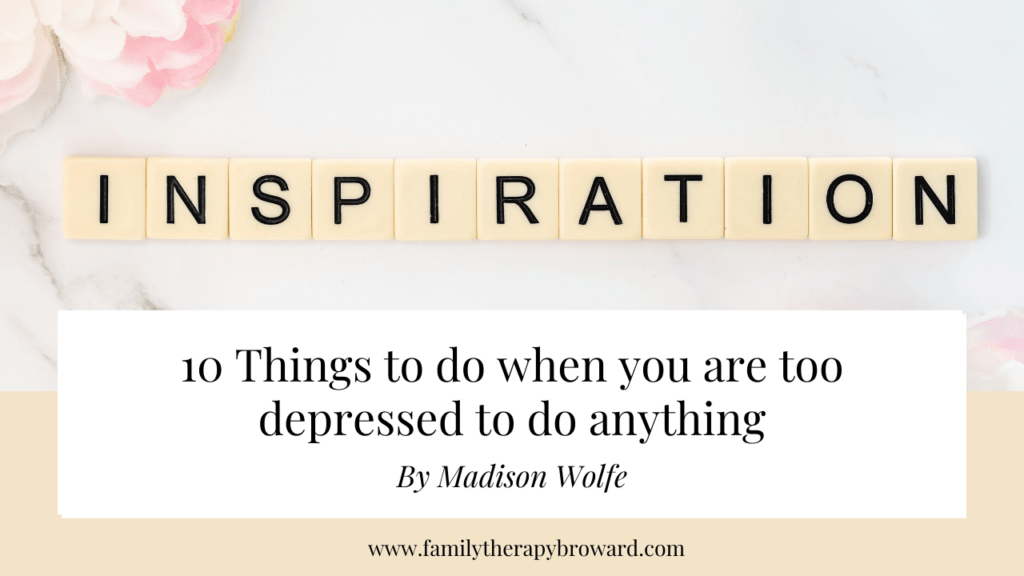
10 things to do when you’re too depressed to do anything.
Are you too overwhelmed? Sick? Numb? Stuck in your thoughts? The thought of anything doesn’t appease you? Your friend’s and families’ suggestions aren’t helping you become less depressed. Here are 10 suggestions on what to do when you’re too depressed to think about doing anything or just don’t want to do anything.
-
Get outside
Changing your scenery could assist you in motivating you to do something else. Try going to your favorite coffee shop or your local park. Changing your daily routine could help you feel better about the rest of your day. Some quality time outdoors can help relieve mental health symptoms. Being outside can help reduce stress. Just spending 20—30 minutes outside can help reduce cortisol levels, the natural chemical in your body that causes stress. Being outside relieves muscle tension, boosts moods, and can put your mind at ease. It allows your mind to decompress and normalize getting your mind back on track and energized.
-
Listen to music
Music can bring you into a different world. It can help to fill some silence and give you something to think about. It triggers a release of dopamine to your brain and acts as a natural happy chemical we receive as part of a reward system. Music can change your mood, depending on what type of music you listen to. It may have some benefits to your brain, including improving your attention and memory. Music can energize you, excite you, help you sleep better, lower stress improves health, and elevate your mood. So, the next time you’re listening to music, maybe you’ll think about how it’s actively affecting your mood. That’s sort of the beauty of it- music naturally brings us joy when we need it the most.
-
Meditate
Meditation is doing something but try changing how you think about it. Meditation isn’t always easy. It does put you more in touch with your feelings and emotions, even the distressing ones. It can help you notice thoughts and feelings. Try to accept them without judging yourself or putting yourself down. If you get lost in your thoughts, remember to be kind to yourself. Meditation can help alter those feelings and thoughts of depression by getting your brain to focus on one thing. Meditation may not make all the symptoms of depression disappear but it will help you manage them by changing how your brain reacts to stress and anxiety.
-
Reach out to a friend
When you don’t want to do anything, reaching out to a friend can sometimes help. Different friends can help in different ways. Some are more empathetic than others and some friends are a healthy distraction. You could reach out to a friend to get some suggestions on what to do, a friend who gives good advice could help the most. If you want to vent to someone, try to reach out to a friend who is more empathetic.
-
Check in with yourself
Are you meeting your physical or emotional needs? You can start by asking about yourself: For example, Do I need to eat? Do I need alone time? Would I feel better with people around me? Am I hydrated? Should I get more/less sleep? Depending on how you answer these questions, you may need to make sure you set some time for self-care. If you’re having trouble finding ways to self-care, here are some suggestions:
-
- Try arts & Crafts- Video streaming platforms can teach you different methods if you want to learn about your artistic ability.
- Clean up- Many people find cleaning their space to be relaxing and refreshing. Even a quick 10-minute tidy-up could motivate you to feel calmer, more at peace, and grounded.
- Play spa- Try taking a warm bath, aromatherapy or giving yourself an at-home facial. This could be the first step in making yourself feel much better.
-
Rethink relaxation
The easiest thing to do when you’re feeling low and depressed is reaching for your remote or your phone. You could get lost and distracted for hours by gluing your eyes to the tv or phone. Don’t get me wrong, re-watching tv and funny videos can crush some time and distract you from feeling sad, but that is a distraction. It never hurts to take a break from the screens and think about other relaxation ways that may benefit you more.
-
- Reading a good book
- Laying on the grass looking up at the sky
- Opening a window and focusing on every detail you see
- Doing stretches
- Listening to music
- Taking a shower
- Going on a long walk
-
Ask for what you need
It might feel easy to isolate, but turning to someone who loves and cares about you may be a better option. Most people aren’t mind readers so they won’t know what you may need unless you ask. For instance, if there is something that a sibling is doing to both of you, you could always talk to that sibling or discuss it with a parent to make sure your needs are being met. Trusting a loved one can help make the communication effectively improve with time and practice.
-
Change negative self-talk
When someone is depressed, they often engage in negative self-talk. Thoughts such as, “I’m a failure,” “No one wants to be around me,” “I’ll always feel this way.” These are common phrases in a depressed person’s mind. This can be an unconscious habit which in turn, reinforced the feeling of depression. A simple solution is challenging the way we think and feel into positive thinking. Doesn’t that sound easier said than done? For example, to challenge the idea “I’ll always feel this way,” we should think of a time when you’ve felt differently about life. We sometimes think about thoughts as real without challenging them.
-
Do things you enjoy
What use to bring you joy? Was it playing a sport, going on a leisurely walk? Was it volunteering at your local animal shelter? It’s easy to forget about the things we used to enjoy if all you’ve been feeling is depression. In the long term, you’re going to need a whole toolbox of things that you can rely on to get you out of this rut. There are multiple things already mentioned, but what works for you?
-
Make changes in routine/ Creating a Routine
It is easy to be in the same routine that reinforced symptoms of depression. People who are depressed often feel like they’re living in a never-ending cycle of the same routine. For example, getting up, going to work/school, watching the same TV show every night, binge food, going to bed, repeating. A schedule like this can keep a person feeling bad about themselves. Changing routines can help rewire the pathways to dopamine in the brain. The changes do not need to be large to have a positive effect. One example is instead of reaching for the TV remote, commit to taking a short walk first. Instead of having an unhealthy meal, try to make a small effort to eat a healthier one by looking up ideas online.
The problem may be not having enough of a routine. It’s important to have structure to your day to alleviate the symptoms of depression. It may be as simple as getting dressed in the morning rather than lounging around in pajamas all day. This may seem small, but potentially a significant change to daily habits. Establishing new habits and routines can also increase dopamine levels, which can reduce feelings of depression.
Starting these self-help actions may seem challenging at first to a depressed person. However, making small changes every day can help build momentum and increase energy as symptoms of depression may subside. Taking these small steps towards a healthier life can help have a significant effect to reduce symptoms of depression.
If you find that you are having a difficult time starting these steps, reach out to us today, we are here to help you get started in your journey.
Written by Madison Wolfe

From Madison's bio...
Madison credits her warm, relatable, caring and welcoming but straightforward approach as one of her best attributes. She is able to provide a safe space for her clients to effectively communicate their struggles while learning new tools to manage them. Madison feels that her own experience with a family member who struggles with mental health issues has helped her to see the struggles from a sibling point of view, parents point of view and the individual point of view.



